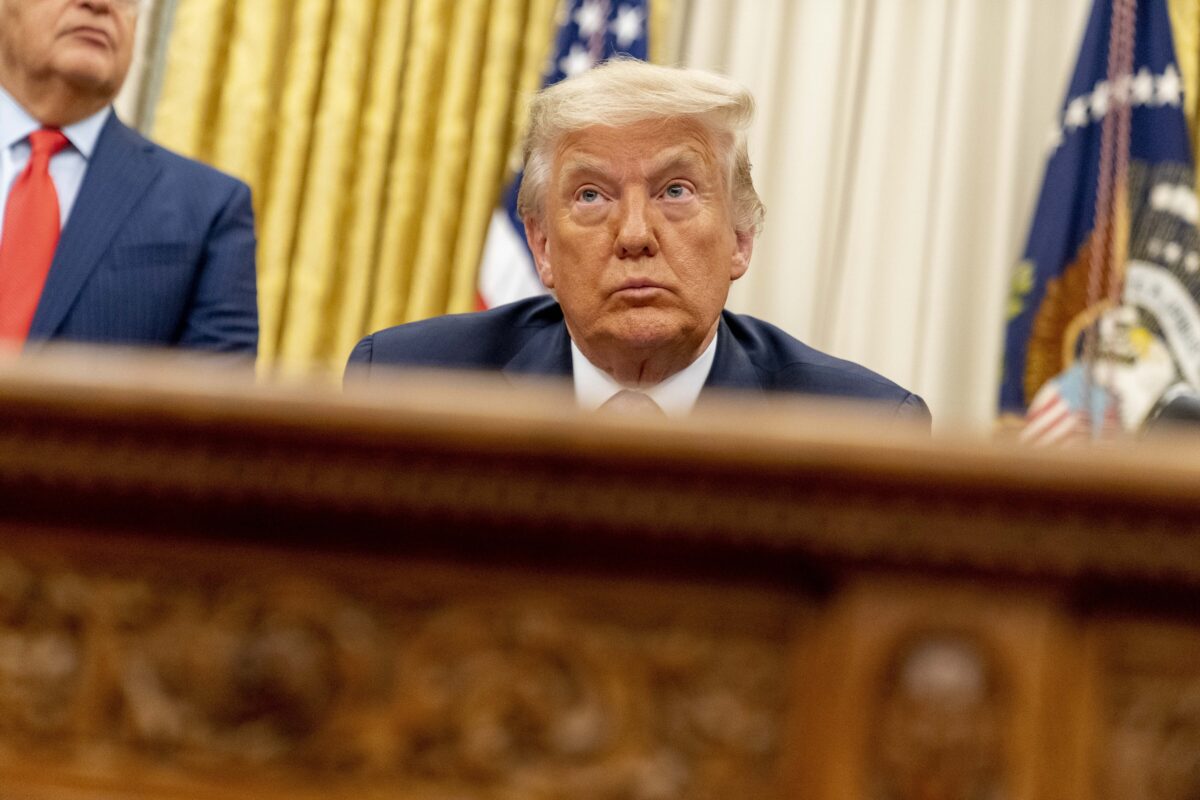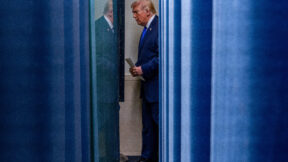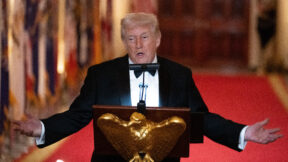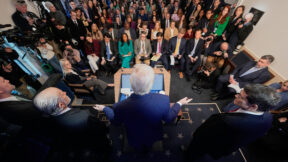Trump Planning to Sign Executive Order Cracking Down on Flag Burning — SCOTUS Already Ruled That’s Protected Speech

AP Photo/Andrew Harnik
President Donald Trump is reportedly planning to sign an executive order targeting burning the U.S. flag — an act the Supreme Court of the United States has repeatedly ruled is protected speech.
Fox News Digital reported Monday morning that Trump was “expected to sign an executive order on Monday cracking down on suspects who desecrate the American flag, including burning it, by mandating they face prosecution.”
According to Fox, Trump’s executive order “will direct the attorney general to prosecute those who violate laws ‘in ways that involve desecrating the flag,’ and to pursue litigation that would clarify the scope of the First Amendment as it relates to flag desecration,” directs the attorney general “to refer flag desecration cases that violate state and local laws to appropriate local authorities,” and “directs the attorney general and secretary of homeland security to deny, prohibit, terminate, or revoke visas or other immigration permits and benefits of a non-citizen ‘wherever there has been an appropriate determination that flag desecration by foreign nationals permits the exercise of those remedies under applicable law.'”
A fact sheet the Trump administration provided to Fox said, “The American flag is the most sacred and cherished symbol of the United States of America, and desecrating it is uniquely and inherently offensive and provocative. It is a statement of contempt and hostility toward our Nation, and an act used by groups of foreign nationals calculated to intimidate and threaten violence against Americans.”
The Fox article does not mention the decades of case law precedent specifically holding that flag burning is protected speech, but the Supreme Court has decided as much on multiple occasions.
In Texas v. Johnson in 1989, the Court held in a 5-4 decision that burning the flag was symbolic speech intended to convey a political message and therefore protected under the First Amendment to the U.S. Constitution. The case arose from an incident at the 1984 Republican National Convention in Dallas where Gregory Lee Johnson burned a flag during a political protest.
The majority opinion by Justice William Brennan was joined by Justices Thurgood Marshall, Harry Blackmun, Antonin Scalia, and Anthony Kennedy and affirmed the opinion from the Texas Criminal Court of Appeals that had overruled Johnson’s conviction. Chief Justice William Rehnquist, and Justices Byron White, Sandra Day O’Connor, and John P. Stevens dissented.
The Texas court’s opinion, cited approvingly by Brennan, read: “a government cannot mandate by fiat a feeling of unity in its citizens. Therefore, that very same government cannot carve out a symbol of unity and prescribe a set of approved messages to be associated with that symbol when it cannot mandate the status or feeling the symbol purports to represent.”
The First Amendment’s protection “does not end at the spoken or written word,” wrote Brennan, who specifically rejected Texas’s argument that the act of flag burning was criminally prosecutable as a disturbance of the peace or as an act that “tends to incite” breaches of the peace. Pointing to the 1969 case of Brandenburg v. Ohio, Brennan wrote that the government can only punish speech where it would incite “imminent lawless action,” but did not find flag burning to constitute such “imminent” incitement.
Kennedy wrote a concurring opinion that acknowledged the popular opposition to flag burning, but nonetheless found that the Court was obligated to uphold constitutional protections:
I agree that the flag holds a lonely place of honor in an age when absolutes are distrusted and simple truths are burdened by unneeded apologetics. With all respect to those views, I do not believe the Constitution gives us the right to rule as the dissenting Members of the Court urge, however painful this judgment is to announce. Though symbols often are what we ourselves make of them, the flag is constant in expressing beliefs Americans share, beliefs in law and peace, and that freedom which sustains the human spirit. The case here today forces recognition of the costs to which those beliefs commit us. It is poignant but fundamental that the flag protects those who hold it in contempt.
The following year, in 1990, the nation’s highest court again took up a flag burning case, in U.S. v. Eichman, which declared a federal law banning flag burning that had been passed in the wake of the Johnson decision was unconstitutional. The Flag Protection Act of 1989 had attempted to get around the precedent by focusing on the action of burning or desecrating the flag instead of the speech, stating that “[w]hoever knowingly mutilates, defaces, physically defiles, burns, maintains on the floor or ground, or tramples upon any flag of the United States shall be fined under this title or imprisoned for not more than one year, or both.”
In another 5-4 decision with the same justices joining the majority and dissenting opinions as in Johnson, the Supreme Court in Eichman again found that flag burning was expressive conduct and therefore protected speech:
Although the Flag Protection Act contains no explicit content-based limitation on the scope of prohibited conduct, it is nevertheless clear that the Government’s asserted interest is “related ‘to the suppression of free expression,’” and concerned with the content of such expression. The Government’s interest in protecting the “physical integrity” of a privately owned flag rests upon a perceived need to preserve the flag’s status as a symbol of our Nation and certain national ideals. But the mere destruction or disfigurement of a particular physical manifestation of the symbol, without more, does not diminish or otherwise affect the symbol itself in any way. For example, the secret destruction of a flag in one’s own basement would not threaten the flag’s recognized meaning. Rather, the Government’s desire to preserve the flag as a symbol for certain national ideals is implicated “only when a person’s treatment of the flag communicates [a] message” to others that is inconsistent with those ideals. (Citations omitted.)
New York Law School professor emerita Nadine Strossen assessed Trump’s proposed executive order as blatantly unconstitutional, telling Mediaite that “even such a revered conservative as Supreme Court Justice Antonin Scalia agreed with his liberal colleagues on the ideologically neutral fundamental free speech principle at stake: genuine respect for the flag demands that we uphold the freedom for which it stands, including above all the freedom to criticize government policies, including through such dramatic symbolic expression as burning the flag.”
The text of the Fox News Digital report did not mention the Supreme Court precedent, but among the links that are embedded in the article (that appear to be auto-generated based on relevant topics) is one to a column in June noting that “Trump’s renewed calls to jail American flag burners clashes with court precedent.”

Screenshot via Fox News Digital.
Monday’s Fox News Digital report does include a mention of “other presidential actions and initiatives [Trump] has launched to restore and promote patriotism, including banning State Department offices nationwide, such as embassies, from flying any other flag than America’s” and “install[ing] two massive 88-foot-tall American flags on either side of the White House in June as part of a patriotic endeavor that Trump personally funded.”
New: The Mediaite One-Sheet "Newsletter of Newsletters"
Your daily summary and analysis of what the many, many media newsletters are saying and reporting. Subscribe now!






Comments
↓ Scroll down for comments ↓